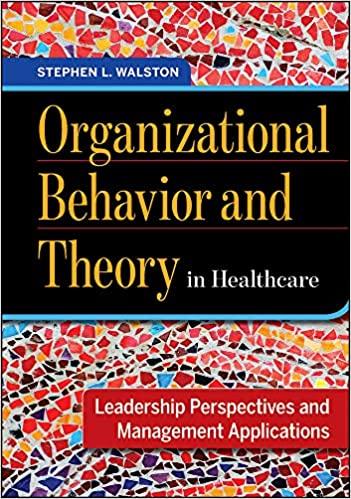What did Dr. Mell identify as the critical issues to be addressed? Dr. Mell, the chief medical
Question:
What did Dr. Mell identify as the critical issues to be addressed?
Dr. Mell, the chief medical officer of a busy tertiary medical center, was having a good day. Well, he was until Dr. Daer, a leading cardiologist at the hospital, approached him in the doctors’ lounge and insisted on speaking with him about an urgent quality problem. After retiring to Dr.
Mell’s office, Dr. Daer stated that a certain primary care physician (PCP)
was, in his opinion, incompetent at reading EKGs (electrocardiograms).
Dr. Daer claimed that this PCP’s incorrect reading of EKGs led to the recent death of a patient.
Dr. Daer said that he and all of his partners were planning to propose that only cardiologists be credentialed to read EKGs or, as a concession, that all EKGs would be “over-read” or reread after a noncardiologist looked at them—and the hospital would pay for these over-readings.
This was a matter of such importance, Dr. Daer stressed, that he and his partners were ready to present the proposal to the medical executive committee or even take it to the hospital’s board of directors.
Dr. Mell, now having a bad day, thanked Dr. Daer for the information, asked him to hold off on presenting his proposal to the medical executive committee or the board, and promised to follow up on his concern and get back to him the next week.
Once alone, Dr. Mell called the chair of the hospital’s quality improvement committee to see what quality issues had been reported from PCPs reading their own EKGs. The chair informed Dr. Mell that this issue had been an ongoing battle between the cardiologists and PCPs. Five years earlier, new credentialing criteria were established for all physicians seeking EKG reading privileges. However, the cardiologists were surprised to discover that many of the PCPs met the criteria, and the cardiologists responded by voicing their concerns. Overall, the quality improvement committee had not found evidence that warranted taking away this privilege from PCPs. However, because of the friction the conflict had caused, the chair told Dr. Mell, several PCPs started to refer their patients who needed a cardiologist to other groups that practiced at other hospitals.
Step by Step Answer:

Organizational Behavior And Theory In Healthcare Leadership Perspectives And Management Applications
ISBN: 9781567938418
1st Edition
Authors: Stephen Walston





